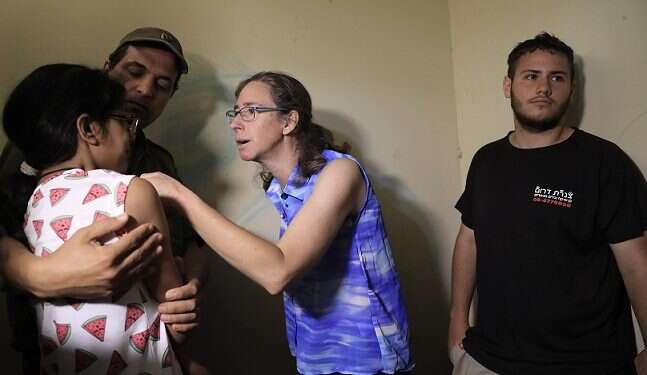After several years of deceptive calm from rocket fire – although recently incendiary kites and balloons have been sent toward Israel from the Gaza Strip – Israeli communities near the border are once again under fire, with dozens of rockets launched from Gaza into Israel on Tuesday.
A gardener at a kibbutz near the border was wounded by shrapnel, and three Israeli soldiers near Kibbutz Sufa, near the southern Gaza border, were wounded and evacuated to Soroka Medical Center in Beersheba. One of them was said to be in moderate condition with wounds to the extremities, and the other two were lightly wounded.
Four residents of the southern town of Sderot arrived in the emergency room at Barzilai Medical Center in Ashkelon after rockets were fired on the city. One broke his ankle running for shelter and the other three were suffering from shock.
Parts of a rocket intercepted by the Iron Dome system on Tuesday landed in the yard of a city school.
"This is routine for us. We had some quiet after Operative Protective Edge [in 2014] but that blew up in our faces," said Sderot resident Ohad Madmoni. "We knew it would happen; it was only a matter of time. We need to fire a few mortars in the direction of the [rocket] fire and everything will work out. Until that happens, we'll hunker down. We aren't responding strongly enough. We need to respond to terrorism with an iron fist. I'm living my life as usual. We won't let them ruin our routine. They won't ever succeed."
Sharon Kalderon, who lives on Kibbutz Sufa, went to stay with her mother in the central Israeli city of Kfar Saba until things calm down. She hopes that will happen soon.
"We sensed things were heating up, but we didn't expect this. It awakens all sorts of fears that we managed to keep at bay since Operation Protective Edge. We really hope that this will be over in a day or two. I left without taking any clothes, knowing that I'd be back," she said.
"My younger son, who's 14, is recognized as suffering from PTSD, with irreparable damage and 50% disability. Our morning started with a panic attack that wasn't pleasant. It was almost impossible to get him out of the safe room, but, unfortunately, we're used to it. We learned how to calm [him down] and deal with it, but it's not a trivial thing when a 14-year-old can't be at home because he's afraid. It's not fun, but this has been our life for the past 10 years."
Residents of communities near Gaza tried to maintain a sense of humor.
"We got a good workout today, running back and forth from the shelter," Adi Rozen of Moshav Netiv Ha'asara said. "But we're used to it and we're not afraid. We're dealing with the situation. Since Protective Edge, the kids have been sleeping in the safe room, so as far as they're concerned nothing has changed. Their nursery school is protected, so everything is normal as far as that goes."
The welfare of children was foremost in parents' minds.
Daniel Matar of Kibbutz Kerem Shalom said, "This means sending the kids back to psychologists to handle [their] questions. This is also the first time my daughter has to handle a round like this. She's five and was only a baby during Protective Edge. I didn't believe I'd have to deal with things like these. We need to stay strong."
Despite the dozens of rockets fired at the Eshkol Regional Council on Tuesday, seven religious and secular families have asked to move to Kerem Shalom, which was due to vote Wednesday on whether or not to take them in.
Udi Orenstein, chairman of the administrative committee at Kerem Shalom, said, "Today [Wednesday], God willing, we'll welcome seven new families to the area. [Kibbutz] members and officials in the kibbutz movement, the government, and the local council have been investing a lot in the demographic development of Kibbutz Kerem Shalom these past few months."
The Welfare and Labor Ministry and local authorities near the Gaza border on Tuesday deployed emergency teams of social workers and volunteers to areas struck by mortar fire to locate people in shock and provide mental health interventions. The ministry also opened five mental health centers that are providing ongoing support for residents of southern Israel. Teams were dispatched to welfare frameworks to help provide elderly and vulnerable populations with tools to cope with the tense situation. Other teams visited schools and nursery schools.
Welfare and Labor Minister Haim Katz allocated 15 million shekels ($4.1 million) to Sderot and other border communities to help residents pay for psychological treatment and extracurricular activities for children and to locate youths at risk who are suffering a traumatic reaction to the security situation.
The IDF Homefront Command has issued orders for schools near the border to open as usual if they have shelters that can be reached before rockets fall. Meanwhile, the Education Ministry has canceled field trips close to the border and has issued instructions for any field trips not to come within 15 kilometers (9 miles) of the border.
The Yavne Municipality in central Israel announced Tuesday that it was canceling a class bar mitzvah ceremony for eighth-graders that had been scheduled to take place at the Yoav Fortress east of Ashkelon. The students returned home.




